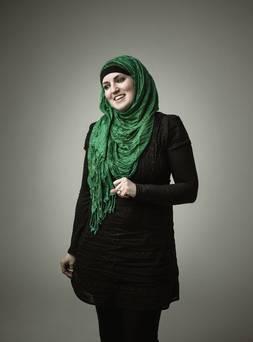500 Convert to Islam in Ireland Every Year

In a country where only 34pc of approximately 3.8 million Catholics attend Mass, many people are drifting away from religion. But a small number are finding that Islamic beliefs and practices, which allow for a peaceful and community-oriented life, fit their spiritual needs.
It is estimated that up to 500 Irish people convert to Islam every year. There is no official register and no baptism – to convert you simply have to recite the testimony of creed in front of two Muslim witnesses.
While more women convert than men, and most conversions are for marriage, people can have very personal reasons for converting.
Ireland has a thriving Muslim community. Building begins next year on what is set to be the biggest Islamic cultural centre in the country, in Clongriffin on Dublin's northside. There are mosques and dedicated primary schools in each of our cities. And unlike the situation in France, there is no policy against Muslim girls wearing the hijab (veil) to school.
Support for converts is offered by the Muslim Sisters of Eire, an organisation run by Irish Muslim women, and at the Islamic Cultural Centre in Clonskeagh, Dublin, where theologian Dr Ali Salem teaches a course for new Muslims.
"When people revert, they can be very enthusiastic," says Dr Salem. "We teach a moderate understanding of Islam, and we also teach them [converts] how to change their lives gradually."
Here is how Aishah (formerly Liza) Caulfield (36, creche worker) converted to Islam:
I come from Irishtown in Dublin 4, born and bred Irish. I became interested in Islam around 12 years ago.
My lifestyle wasn't typically Irish on the social level. I wasn't going to nightclubs and I wasn't into drinking. I always wondered if there was a group of people out there who had a quieter lifestyle, a faith that matched how I lived my life.
I was missing a piece of the puzzle, and I was always searching. I already fitted this religion – I just needed to find it.
Through research I kept coming across Islam. I wasn't very outward about it at the beginning. When 9/11 happened I thought, "Right, maybe not now, but I'll continue looking". I took the official conversion, the Shahada, three years ago and got married last year to a Muslim from Mauritius.
My dad said, "It's about time", when I took the Shahada. My family bought me hijabs and my dad was like, "I'll get you one of those Qurans." He was very hands-on. He's a staunch Catholic, goes to confession every month and Mass every Sunday. He'd be praying morning and night.
I'm definitely happier. Islam's a quieter, more peaceful way of life. There's a great sense of unity – our prayer times change day-to-day as the sun rises and sets. Everybody who's Muslim, a quarter of the inhabitants of the world, is facing Mecca and praying at the same time. That is a very powerful and sacred feeling, putting your face to the floor and submitting to God.
The one big change is wearing the hijab. I wear it because it's a sign of my devotion to God. It shows humility with my husband and with the male members of my family. For me my beauty is my hair and my body, and that's not for everyone.
I also wear it because one part of my faith is to discuss Islam with non-Muslims. If I'm in the supermarket and someone hears my Ringsend accent, they'll ask, "Oh, how long are you here, love?" And I'll reply, "Actually, I'm Irish". It's a way of sharing your faith with people, of saying: "Don't be afraid of us – we're all human, we all come and go the one way."
I always dressed modestly. I was never comfortable with showing the figure off. We're living in a society where people feel threatened because I choose to not show my body.
You should be valued for your soul and your personality, not because of how much flesh you show – that's private, and that's your beauty.
People often look at Muslim women and think we must feel oppressed. When I got married, I was given a bangle, I was given gold pendants, I was given cash and I was given land by his family.
You're going to hear negative stuff in the media – "Oh, the poor Afghan women" and that – but I often say to people: "Please, don't confuse culture with the faith itself."
Source: Irish Independent



